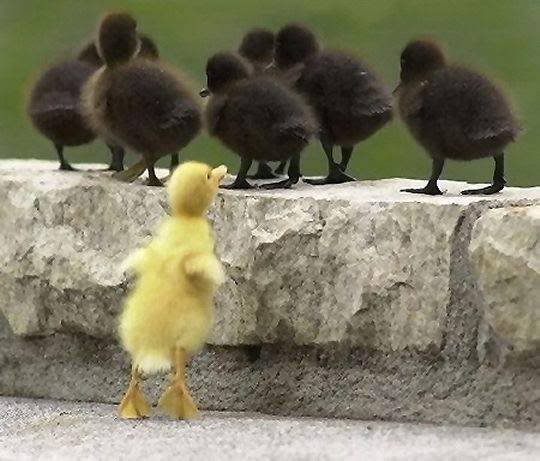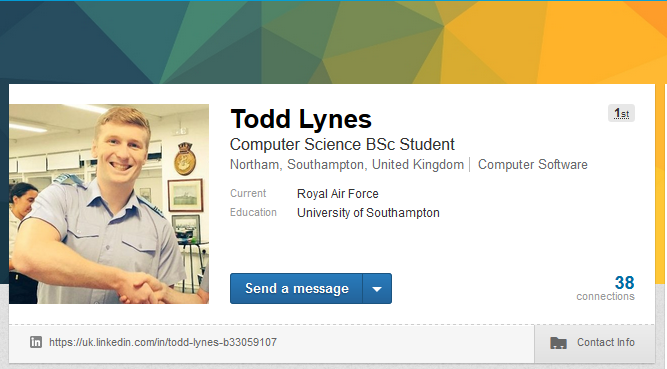
Today, I’m tasked with discussing ethical issues of Social Media in the Education or Business realm. I chose the issue of Discrimination – both positive and negative.
How do Businesses use Social Media?
We know from Mr Blythes’ Blog from last week, 94% of employers have admitted to using social media website LinkedIn in recruitment. Also, 1 in 5 of jobseekers have professional information on their Facebook profiles. Which is also used by recruiters to check the suitability of a job applicant.

My LinkedIn profile – I reveal my University, Ethnicity, Gender, Job. Can this make me a victim of discrimination?
What is the Ethical Issue?
The issue I’m raising is that of ‘Discrimination’. This is how recruiters can discriminate against candidates by their race, gender, religion, style, marital status, disability and so on…
Although clearly, a recruiter can go on someones LinkedIn page, see that the candidate is black and decide not to recruit the person based on their identity – this is just racism.
But do we discriminate without thinking about it?
A lot of research has gone into this – called Unconscious Bias. Asking whether we discriminate without being conscious to it.
As humans, we process 11 million bits of information per second, but are only conscious of 40 bits. (source) So we make many unconscious decisions each second.
Studies have also shown that people, using information gathered through our lives, place instant judgement on people, whether we try to or not. Here take the Harvard test on Implicit Bias.
So What?
This shows, that regardless of who you are, you will probably be guilty of unconscious bias. UCAS are now going to go name-blind in recruitment to stop racial bias. (source) So it raises questions that with recruitment using LinkedIn, revealing a lot about our identity – how do we know we aren’t being discriminated against? So should Social Media be used by businesses?
Maybe they should just be more careful like UCAS…
The best video to explain unconscious bias and what it means in the workplace.
Image Source: http://media.photobucket.com/user/RobertOak/media/stop_discrimination.jpg.html?filters%5Bterm%5D=discrimination&filters%5Bprimary%5D=images&sort=1&o=33 Licence free on photobucket.
Hi Todd,
Your post particularly stood out to me because I just had a lecture all about discrimination! You mentioned the unconscious bias and I wanted to add to your post with what I’ve learnt this week. At times when the brains mental processing powers are comprised, (due to time pressure, preoccupation or due to tiredness) our brain will use cognitive strategies such as categorization as a mental shortcut. For example if you meet someone who is Canadian and stupid, you may think all Canadians are stupid (which is obviously untue). Which is how these discriminatory ideas develop sometimes. Here is some further reading http://www.enei.org.uk/pages/the-nature-of-bias-and-discrimination-.html
This leads on very nicely to the question you asked “should social media be used by businesses”. Due to the unconscious bias and categorization. I believe that businesses looking for candidates should have a “screening” technology that allows them to see candidates but takes out pictures, names, genders and other sensitive information. What do you think about this? Obviously it would be very hard to implement and get businesses on board with it but I think it could be very doable.
Hollie
LikeLike
Hey Hollie thanks for the Discussion!
I enjoyed the video on that link of the short scenario on the ‘HR Dilemma’. As it does again show even when there is discrimination, the cause becomes a problem in solving as people are afraid of being tainted with it themselves.
Yes I agree with your idea of a screening policy. As shown in my video, there was a study on this and when given two identical CVs of a man and a women, the man got the job most of the time. (In this particular study but the point is still there). So if you didn’t know what the identity of the person was, you could make a fairer choice.
Although this does raise issues on positive discrimination, as it could help rich people who can afford better educations and qualifications and stick some people in a glass ceiling. But that is another debate.
Thanks Hollie!
LikeLike
Pingback: Time to Say Goodbye: The Ethical Issue of Privacy | Hello internet…it's Hollie
Pingback: How my Digital Life got turned upside down | A Bright New start